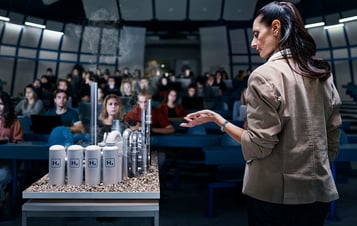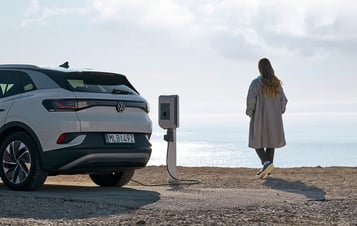Video player requires marketing cookies.
To view this content please click here to allow marketing cookies.
Everyone should be able to keep on flying
Discover how we’re part of transforming aviation today, so you can live fossil free tomorrow.
Taking sustainable aviation fuel to the next level

Together with Shell and SAS we are investigating the production of electrofuel. A low emission synthetic jet fuel that will be produced from fossil free electricity and recycled carbon dioxide originating from district heating. A big shift from using virgin fossil material in the production process and one of the ways we are aiming to help keep people flying in the future.
"Sustainable Aviation Fuel, SAF offers the greatest potential to reduce emissions from aviation. It is only by working together today across the aviation ecosystem to drive the technologies and infrastructure needed to produce SAF at scale that the aviation sector can achieve net zero by 2050. This is why I am excited for this collaboration to explore one more pathway for SAF production,” says Anna Mascolo, President, Shell Aviation.
On the way to more sustainable travel
The goal of the collaboration with Shell and SAS is a new production facility that can produce up to 80,000 tonnes of synthetic Sustainable Aviation Fuel, SAF, annually.
The new production facility could provide SAS with up to 25% of its global demand for SAF in the 2030s.
Brightening the skies

The project looks very promising, and Vattenfall and Shell have agreed to carry out in-depth analyses of the results. The aim is a new electrofuel production facility sometime around 2030. A feasibility study ongoing during 2023 is expected to give more details on the next steps of the project. A great start on the journey to more sustainable travel. But it’s not the only good news when it comes to sustainable aviation.
Fossil free flights from a fossil free airport

We have also initiated a research collaboration with LFV in Sweden to take further steps towards a fossil free transport sector. The aim of the research is the joint development of the design for a fossil free airport.
"Together with LFV, we want to find solutions and install charging infrastructure to make it possible to completely transition to electric vehicles – to, from, and within the airport area and eventually also for electrically operated aircrafts. Other solutions may include installation of photovoltaic installations and battery storage that provide quick access to electricity when the customer needs it", says Maria Lindberg, Head of Heavy Transport at Vattenfall Network Solutions in Sweden.
Want to know more?
Find out more about this topic here.



